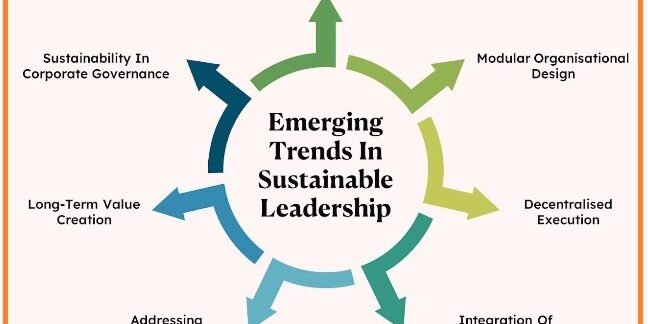In 2025, leadership is not based on obtaining benfitis and operational excellence. It is based on getting long-term features and protecting the planet and society. Sustainability management has changed from a corporate good-to-have to core leadership skills that affect business, brand reputation, and profitability.
As the climate risk intensifies, stakeholders demand accuracy, and ESG (Environmental, Social, and Governance) standards are a main part of different sectors; leaders are expected to make sustainability a main part of decision-making. This is not just a compliance requirement; it’s an accurate working advantage that can determine whether a business thrives or fails in a rapidly changing world.
Introduction: Why Sustainability Leadership Matters
- Sustainability is no longer a buzzword; it’s a boardroom priority. The current leaders face different challenges, like climate change, resource scarcity, strict rules, and socially conscious users who need proper business practices.
- For succeeding in this growing landscape, senior leaders needed to configure sustainability in each part of strategy and operations.
- This is where the sustainability courses play a crucial role. configured for business leaders, that comes with information for configuration to corporate development through environmental responsibility, understanding climate risk, and implementing strategies that deliver long-term value.
- leaders who come with these skills, not future-based proof of organization, and also develop trust among investors, employees, and customers.
Evolution of Sustainability in Business
From CSR to Core Strategy
- At the start, sustainability used corporate social responsibility and was separate from core business. Now it is configured into corporate planning, affecting investment decisions, innovation, and supply chain.
The ESG Imperative
- ESG reporting is commonly used for different countries, also India, where SEBI is part of the sustainability disclosure for the top 1,000 listed companies.
Investor Expectations
- Global-level investors are now assessing companies according to sustainability performance, giving rewards to those with strong environmental and governance practices.
Why Sustainability Management Is a Must-Have Leadership Skill
Driving Long-Term Business Resilience
- Climate risks, like extreme weather conditions, floods, and droughts, have direct financial applications. Leaders who configure sustainability in planning can solve these risks, supply chain resilience, and work according to shifting market dynamics.
Meeting Regulatory and ESG Compliance
- Now governments and regulators are working strongly on ESG compliance. Leaders who have an understanding of sustainability management can make sure their companies remain compliant and turn regulations into high-level chances.
Enhancing Brand Reputation
- brands that wanted to use sustainability work for stronger user loyalty. In India, research indicates that more than 77 percent of users like to buy products from companies that are environmentally responsible.
Attracting and Retaining Talent
- Millennials and Gen Z professionals needed to work for organizations that share values and importance. Sustainable business working helps to attract high-level talent and improve retention.
Innovation and Market Growth
- Sustainability challenges are causes of innovation, like renewable energy solutions to circular economy models. Forward-moving leaders use sustainability as a driver for product and process innovation.following changes towards a sustainable business model without affecting core operations
Competencies for Leaders in Sustainability Management
To lead effectively in 2025, executives must develop:
Strategic Foresight
- The knowledge of long-term environmental and societal trends and their configuration into corporate strategy.
Climate Risk Assessment
- finding, measuring, and solving environmental risks that are affecting working
Sustainable Finance Knowledge
- the knowledge of green investments, carbon markets, and ESG-linked financing.
Stakeholder Engagement Skills
- Develop trust with investors, communities, regulators, and users through transparent communication.
Innovation and Change Management
Examples of Sustainability Leadership
Tata Power
- They are committed to getting net zero emissions by 2045 and rapidly growing renewable energy projects.
Mahindra & Mahindra
- They are India’s first carbon-neutral factory and investment for electric mobility solutions.
ITC Limited
- They have achieved 100 percent solid waste recycling and a water-positive status for two decades.
Infosys
- They are carbon neutral well ahead of their 2025 target and configure sustainability in every business decision.
These examples indicate sustainability is not an environmental obligation—it’s a competitive advantage.
How Leaders Can Start Their Sustainability Journey
Integrate Sustainability into Business Strategy
- It is part of the main business objective, not a distinct CSR initiative.
Invest in Sustainability Education
- the leadership teams with data for driving sustainable transformation.
Adopt Global Frameworks
- Follow standards such as GRI (Global Reporting Initiative), TCFD (Task Force on Climate-related Financial Disclosures), and ISSB.
Leverage Technology
- the use of artificial intelligence, blockchain, and IoT for sustainable supply chain tracking, management of resources, and energy efficiency
Measure and Track KPIs
- Regular monitoring of sustainability metrics helps to provide continuous improvement.
Future of Sustainability Leadership
- At the end of 2030, sustainability will be a main part of leadership. A business that does not have its integration will face challenges for growth, and one that uses these features will thrive in a low-carbon, socially responsible economy.
Sustainability leaders will be expected to:
- Champion climate-positive innovations.
- Align business success with global sustainability goals (SDGs).
- measurable effect for people, planet, and profit.
Conclusion
In the fast-growing world, sustainability is no longer a niche skill; it is the hallmark of future-ready leadership. Executives who use it will be steering their company for longer-term success for a resource-conscious, climate-sensitive economy.
For leaders getting accurate knowledge and frameworks, sustainability courses give detailed information on environmental integration and social responsibility in business planning.
Through mastering these rules, leaders make sure they are not only navigating changes but also working for a sustainable and prosperous future.





